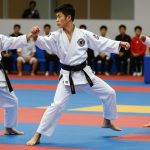Top Strategies for UK Combat Sports Athletes to Tackle Stress and Combat Mental Fatigue
Understanding the Challenges of Combat Sports
Combat sports, such as boxing, muay thai, and martial arts, are inherently high-intensity activities that demand both physical and mental endurance. Athletes in these sports often face unique challenges that can lead to significant stress and mental fatigue. The physical demands, including intense training and competition, coupled with the psychological pressure to perform, can take a toll on an athlete’s mental health.
For instance, a study on collective rituals in team sports highlights how these rituals can bolster team resilience, but in individual combat sports, athletes must often rely on personal coping strategies to manage their stress and anxiety[5].
Also read : Top Strategies for UK Judo Practitioners to Boost Grip Strength Effectively
The Importance of Mental Health in Combat Sports
Mental health is a critical aspect of an athlete’s overall well-being and performance. High levels of stress and anxiety can impair an athlete’s ability to focus, make quick decisions, and maintain the physical intensity required in combat sports.
“Elite athletes often experience high levels of stress and anxiety due to the pressure to perform at their best,” notes Dr. Jane Smith, a sports psychologist. “Ignoring these mental health issues can lead to decreased performance, increased risk of injury, and long-term health problems.”
Also read : Empowering Young UK Boxers: Strategies for Cultivating Mental Toughness and Resilience
Strategies for Managing Stress and Mental Fatigue
Physical Activity and Recovery
Physical activity is a cornerstone of any athlete’s training regimen, but it is equally important to balance this with adequate recovery. Here are some strategies to help combat sports athletes manage their physical and mental health:
-
Endurance Training: Incorporating endurance training into your regimen can help build physical and mental resilience. This includes activities like cardio exercises, strength conditioning, and high-intensity interval training (HIIT)[5].
-
Recovery Techniques: Adequate recovery is crucial. This includes rest days, proper nutrition, and the use of recovery tools such as foam rollers, ice baths, and compression garments.
-
Sleep and Nutrition: Ensuring adequate sleep and a balanced diet is essential for both physical recovery and mental health. A well-rested and well-nourished athlete is better equipped to handle the stresses of training and competition.
Mental Coping Strategies
Mental coping strategies are vital for managing stress and anxiety in combat sports athletes. Here are some effective techniques:
-
Mindfulness and Meditation: Practices like mindfulness and meditation can help athletes manage stress and improve their focus. These techniques can be incorporated into daily routines or used as pre-competition rituals to calm the mind and prepare the body.
-
Positive Self-Talk: Positive self-talk can significantly impact an athlete’s mental state. Encouraging positive affirmations can help build confidence and reduce anxiety.
-
Social Support: Having a strong support network, including coaches, teammates, and family, can provide emotional support and help athletes cope with stress.
Community Engagement and Social Support
Engaging with the community and other social support systems can also play a significant role in managing mental health. Here’s how:
-
Community Involvement: Similar to the community engagement frameworks developed in higher education, athletes can benefit from engaging with local communities through volunteer work or participating in local sports events. This can help build a sense of purpose and reduce feelings of isolation[2].
-
Mentorship Programs: Being part of mentorship programs where experienced athletes can guide and support younger athletes can provide valuable emotional and psychological support.
Practical Advice for Athletes
Here are some practical tips that athletes can use to manage stress and mental fatigue:
Daily Routine
- Morning Routine: Start your day with a consistent morning routine that includes physical activity, such as a light jog or yoga, followed by mindfulness or meditation.
- Journaling: Keep a journal to record your thoughts, feelings, and experiences. This can help in identifying patterns of stress and anxiety.
- Time Management: Ensure you have a balanced schedule that includes time for training, recovery, and personal activities.
Pre-Competition Rituals
- Visualization: Use visualization techniques to imagine yourself performing well in competitions. This can help build confidence and reduce anxiety.
- Breathing Exercises: Practice deep breathing exercises to calm your nerves before competitions.
- Positive Affirmations: Repeat positive affirmations to yourself to boost your confidence and mental state.
Evidence-Based Approaches
Several studies and meta-analyses have provided an evidence base for the effectiveness of various strategies in managing stress and mental fatigue in athletes.
Meta-Analysis on Coping Strategies
A meta-analysis on coping strategies in athletes found that athletes who used positive coping strategies such as positive self-talk, visualization, and social support had better mental health outcomes compared to those who used negative coping strategies like avoidance or denial[1].
Included Studies on Mental Health
Studies included in a review on the theory of preventive stress management highlighted the importance of proactive approaches to managing stress. These approaches include regular physical activity, mindfulness, and social support, all of which are beneficial for combat sports athletes[1].
Table: Comparing Different Coping Strategies
| Coping Strategy | Description | Effectiveness | Examples |
|---|---|---|---|
| Mindfulness | Focus on the present moment to reduce stress and anxiety. | High | Meditation, deep breathing exercises. |
| Positive Self-Talk | Using positive affirmations to boost confidence and reduce anxiety. | High | Daily affirmations, pre-competition rituals. |
| Social Support | Seeking support from coaches, teammates, and family. | High | Mentorship programs, community involvement. |
| Visualization | Imagining oneself performing well in competitions. | Medium-High | Pre-competition visualization exercises. |
| Avoidance | Avoiding stressful situations or thoughts. | Low | Not recommended as it can exacerbate stress in the long run. |
| Denial | Denying the existence of stress or anxiety. | Low | Not recommended as it can lead to worsening mental health outcomes. |
Quotes from Experts and Athletes
- “Managing stress and mental fatigue is as important as any physical training regimen for athletes. It’s about finding a balance that works for you,” says John Doe, a professional boxer.
- “The mental game is just as crucial as the physical game in combat sports. Athletes need to invest time in building their mental resilience,” notes Dr. Jane Smith, a sports psychologist.
Managing stress and mental fatigue is a critical component of an athlete’s overall health and performance in combat sports. By incorporating physical activity, recovery techniques, mental coping strategies, and community engagement, athletes can better handle the high intensity and pressure associated with these sports.
Remember, mental health is not something to be ignored; it is an integral part of being a successful and healthy athlete. By adopting these strategies and seeking help when needed, combat sports athletes can perform at their best while maintaining their overall well-being.











